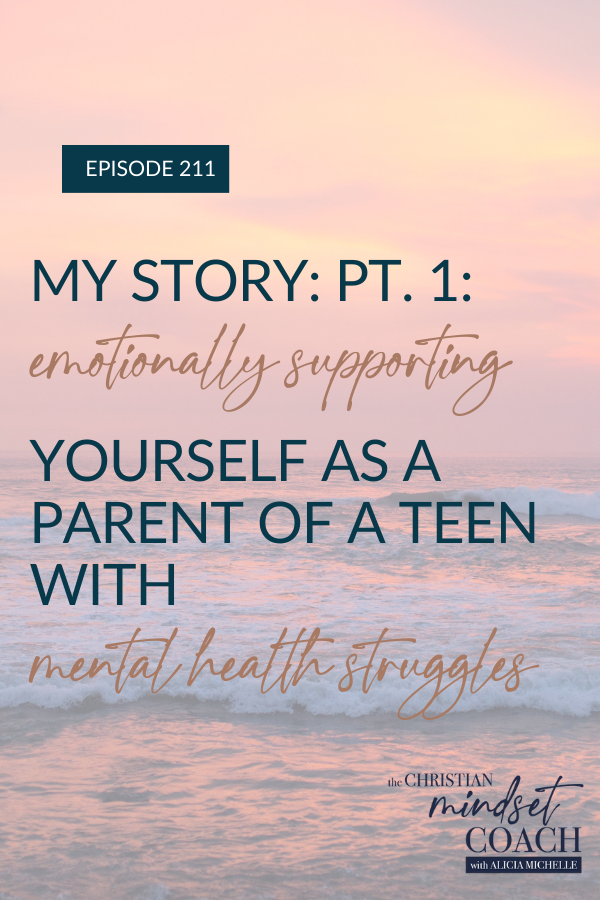Trigger warning: This episode discusses teen depression and suicidal behavior. If you or someone you know is struggling with depression, you are not alone. If you are in crisis, please call or text the Suicide and Crisis Lifeline at 988, or dial 911.
Parenting teens with mental health issues can be challenging. You may not know what to say or do. You may even feel like you’re alone. In this episode of the Christian Mindset Coach podcast, I share what it’s been like for me as a parent of a struggling teen, as well as help for parents walking through similar seasons. Listen in to learn more about scripture we can turn to for comfort and guidance as well as a peek into next week’s episode covering more on mental health resources.

WHAT YOU’LL LEARN:
- [02:38] Why do parents need help when it’s the child suffering?
- [05:38] What’s the difference between concern and worry when our children are struggling?
- [11:28] How do we handle the scary “what if” questions when our teen is struggling with mental health?
- [13:44] When you blame yourself for your teens mental health issues
- [19:26] What does the Bible say about our responsibilities in parenting?
- [24:40] God’s reminders and help for parents guiding their children through mental health struggles
- [28:46] What to expect on next week’s episode
[02:38] Why do parents need help when it’s the child suffering?
Why does emotional support for parents matter in times like these? While the person who is directly struggling with mental health issues obviously needs support, as a parent of a child struggling with mental health issues, there's all kinds of emotional turmoil going on inside of you too. In order for you to show up strong and resilient for your child, you need to have a strong foundation. You need to be able to feel like you can process all that you're going through.
The number one thing is that we have got to take care of ourselves, especially during these times. That means going back to the basics of rest, sleep, healthy food, boundaries, and of course our connection with Christ. We cannot be strong and resilient and be directing other people to be strong and resilient if we don't have a strong foundation in Christ. We have to stand strong with that anchor of hope that is in Christ, so more than anything at this time, there has to be that growing, ongoing feeding of our own soul, and space to ask questions of God.
[05:38] When our children are suffering, what’s the difference between concern and worry?
A great resource for parents supporting their loved ones through mental health issues is the ability to differentiate between concern and worry. When someone first pointed that out to me, it was a huge light bulb moment and made a world of difference in how I processed what was happening.
With both concern and worry, we're taking note of what's happening, noticing the issues, and we're watching the status of what's going on, making connections and trying to understand it. The difference is what we decide to do with the observations and the information.
Worry is doing what we can and then continuing to control it, or attempt to control it, from afar. This is what is allowing our minds to obsess, to ruminate on the situation and the ‘what ifs.’ We're trying to plan or trying to control, always looking for a way to fix it. Prayer might be a part of it, but it's an obsessive type of prayer, “You must fix it now God, you’ve got to change the situation.” We’re often telling Him that He has to resolve a situation in a specific way.
I found that I was practicing certain habits that were actually hindering God’s healing process. It was like God was saying, “Put it down, girl. You need to let me do the work here. You need to just step back and you have to trust me.” Meanwhile, we’re still staying in our own strength versus letting it happen in God's strength. We can't have it both ways.
In contrast, concern is where we see what's happening, but we are releasing the control and the responsibility for the outcome. We still see that things aren't right. We still see that there are problems, and despite what the enemy will try to tell us we're not ignoring them, but we’re letting God handle it in the way that He wants to handle it. We’re removing responsibility from ourselves and putting it back on God and on that person's decision to respond.
Our action here is continual prayer, continually lifting the situation or person up in a watchful kind of prayer. We’re bringing all of our feelings and all the things that we’re seeing before God, and we’re doing it in a way to say “this is what is really troubling me, God.” We’re not telling Him how to handle it. We’re being prayerful to remind ourselves that we can't handle fix the situation for our loved one and we’re asking God for encouragement and clarity around what we can handle or do.
[11:28] How do we handle the scary “what if” questions when our teen is struggling with mental health?
Trigger warning:
When you’re parenting teens with mental health issues, that ‘what if?’ question is always there, lurking in your mind. That was a signal for me that I was spinning in worry versus concern. My biggest what-if questions were around the issue of suicide. We’d put safety protocols in place in our home, but I still had to battle thoughts like “What if she takes a bottle of pills from someone at school and overdoses? What if she tries to hang herself with a scarf or shoelace in her room?” Once you’ve gone through something like this, you’re on high alert, and your mind will probably find it easy to start to play out worst case scenarios in an attempt to protect yourself and your child.
When I began to spiral into this type of thinking, I had to stop and say to myself, “What if the ‘what if’ happens, as horrible as it may be?”
I had to go back to the times in my life when God brought me to a situation where something really tragic or difficult happened. In those times, God always provided me with the strength to get through that moment. So, as horrific as those ‘what if’ situations may be, because I know they are a reality for some people in their story, I had to get to a place where I could say, “Lord, you know I would never want that to happen, and it terrifies me to even think about it, but the truth is that you have not brought that to me right now in this second. My story is what is in front of me, period. That's it. So I'm going to say again, that I trust in you and that if this happens, I know you will give me the manna to walk through it. But today, you're not asking me to walk through it. So I don't need to walk through it. I can let it go.”
[13:44] When you blame yourself for your teens mental health issues
When your child is struggling with mental health, guilt and shame can become a massive struggle for parents. For me specifically, it was the language of “I did something wrong. This is my fault. She’s here because I made a mistake as a mom.”
Let me tell you friend, if you are carrying that weight, you have to let it go. None of us have been perfect parents. And if we’ve made mistakes, no matter what we’ve done, our God is bigger. He always offers hope for restoration.
This was something that I had to really internalize and figure out. For starters, I had to recognize that I am not responsible for whether or not my kids choose to follow Christ or have seasons of mental health struggles. At the end of the day, we have to understand whatever we’re giving them, teaching them, showing them, is still being filtered through their circumstances, their situation.
This can be heartbreaking as a parent because we love these kids so much and we just want them to understand the difference between life without Christ and life with Christ. We want them to know no pain, to never have to fall and to never see destruction in their life. We want them to just get it, don't we? We have to remember that no matter how much we want that for them, it’s just not the human way. They have to experience life for themselves.
[19:26] What does the Bible say about our responsibilities in parenting?
About two weeks prior to recording this podcast episode, I really had to come to terms with something I had been wrestling God with. It was this idea of figuring out what our responsibilities are as parents to teens who are struggling. I kept thinking, “Why did this happen, God? I did X good thing and I showed them Y good truth. Maybe I messed up in this area or maybe I should have said this…” All of those thoughts came piling in and I realized I needed time to be alone with God and deal with the heaviness that I was feeling around it all.
I intentionally set some time aside and let my family know that I needed to be alone for a few hours. I went out to our backyard and journaled all of my feelings and thoughts, sitting in the stillness, waiting to hear the whisper of the Holy Spirit about what I was called to do as a parent.
What I heard God say was this: “Look through my Word. What are you responsible for as a parent?” He took me through verses in Deuteronomy, Proverbs, and the New Testament. It was like I was seeing them for the first time, spelling out the idea of responsibility on both sides of the parental-child relationship. In Deuteronomy, for example, it talks about walking along and sharing the road with your children, encouraging them by showing them the truth and making it a part of everyday life. I needed to let the guilt and shame go and focus on what God had called me to do as a parent, which was just continue to share His truth and His love.
[24:40] God’s reminders and help for parents guiding their children through mental health struggles
In passages like Romans 1, God reminds us that we have to leave room for our loved ones to accept His truth on their own. We can pray for our child to change, to get it, to see the truth, but we should also be praying for our ability to surrender. We can pray that we’ll be able to recognize how God wants us to guide our child, that He would help us separate out what His expectations are for us as parents and the expectations that we have.
We can wait with expectation of what God is going to do, but we also have to leave room for our kids to accept the love and to accept the truth on their own. We need to recognize that we serve a very big God, a God who works outside of what our child sees in our homes, a God who has journeys and adventures for our children that are going to be beyond the years that they are in our homes.
[28:46] What to expect on next week’s episode
There’s so much that can be said when it comes to parenting teens with mental health issues, so we’re going to continue this conversation on next week’s episode of the podcast where I’ll be sharing more about the mindsets we can fall into, pitfalls to be aware of, and how we can ask God for help during these times.
I’ll also be sharing some really great resources to continue the conversation and to help parents walking through similar situations. See you back here next week!
RESOURCES:
Calm Your Anxiety Mindset Tool Kit
OTHER RELATED EPISODES:
210: My Daughter's Story: A Christian Teen's Journey Through Depression, Suicide + Eating Disorders
209: A Doctor's Personal Struggle with Depression with Dr. Michelle Bengston
202: 5 Bible Verses and Christian Affirmations for Calming Anxious Thoughts
Write a 5-Star Rating and Review and Get a Free Gift: 50 “I Am” Declarations ($47 value)!
If you love this podcast, would you take a second to write a five star rating and review? If so, I’d love to send you a free gift: the 50 ‘I Am’ Declarations. This is an audio and written statement of who we are in Christ, and includes Bible verses and powerful statements about identity that you can proclaim over your life.
To get the free gift ($47 value), take a screenshot of your five star rating and review and then email that screenshot to Hello@VibrantChristianLiving.com, and we’ll send you access to the resource! Thank you again for helping us get the word out about the podcast in a bigger way!

